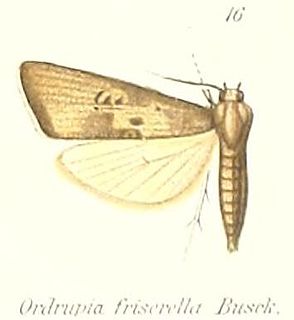| Dragmatucha | |
|---|---|
| Scientific classification | |
| Kingdom: | Animalia |
| Phylum: | Arthropoda |
| Class: | Insecta |
| Order: | Lepidoptera |
| Family: | Lecithoceridae |
| Genus: | Dragmatucha Meyrick, 1908 |
Dragmatucha is a genus of moths in the family Lecithoceridae. [1]
| Dragmatucha | |
|---|---|
| Scientific classification | |
| Kingdom: | Animalia |
| Phylum: | Arthropoda |
| Class: | Insecta |
| Order: | Lepidoptera |
| Family: | Lecithoceridae |
| Genus: | Dragmatucha Meyrick, 1908 |
Dragmatucha is a genus of moths in the family Lecithoceridae. [1]

The Elachistidae are a family of small moths in the superfamily Gelechioidea. Some authors lump about 3,300 species in eight subfamilies here, but this arrangement almost certainly results in a massively paraphyletic and completely unnatural assemblage, united merely by symplesiomorphies retained from the first gelechioid moths.

Gelechioidea is the superfamily of moths that contains the case-bearers, twirler moths, and relatives, also simply called curved-horn moths or gelechioid moths. It is a large and poorly understood '"micromoth" superfamily, constituting one of the basal lineages of the Ditrysia.

Copromorphidae, the "tropical fruitworm moths", is a family of insects in the lepidopteran order. These moths have broad, rounded forewings, and well-camouflaged scale patterns. Unlike Carposinidae the mouthparts include "labial palps" with the second rather than third segment the longest. With other unusual structural characteristics of the caterpillar and adult, it could represent the sister lineage of all other extant members of this superfamily. The genus Sisyroxena from Madagascar is also notable for its unusual venation and wing scale sockets.

The Lecithoceridae, or long-horned moths, are a family of small moths described by Simon Le Marchand in 1947. Although lecithocerids are found throughout the world, the great majority are found in the Indomalayan realm and the southern part of the Palaearctic realm.

Mnesarchaea is a genus of "New Zealand primitive moths" in the family Mnesarchaeidae. This genus is endemic to New Zealand.

Dichomeris is a genus of moths in the family Gelechiidae erected by Jacob Hübner in 1818.
Helcystogramma is a genus of moths in the family Gelechiidae. The genus was erected by Philipp Christoph Zeller in 1877.

Hypatima is a genus of the twirler moth family (Gelechiidae). Among these, it belongs to a distinct lineage, which is variously treated as tribe Chelariini in subfamilies Dichomeridinae, Gelechiinae, or even Pexicopiinae, and historically was considered a subfamily in its own right, Chelariinae. Of this lineage, Hypatima – under its junior synonym Chelaria – is the type genus. This genus has numerous species, but its exact limits are not quite clear. This genus occurs mainly in the Southern Hemisphere, though one of the better-known species is the only member of this genus native to Europe, the lobster-clawed moth.

Eudonia is a large and widespread genus in the grass moth family (Crambidae), subfamily Scopariinae. There is no common name for the roughly 250 species placed here; new species are still being described regularly. Although the genus was proposed early in the 19th century, many of these moths were for a long time retained in Scoparia, the type genus of the subfamily and a close relative of Eudonia. A few small genera have been proposed for separation from Eudonia, but given the size of this group this is not particularly convincing; thus, all are retained here pending a comprehensive phylogenetic review.

Udea is a genus of snout moths in the subfamily Spilomelinae of the family Crambidae. The genus was erected by Achille Guenée in 1845. The currently known 214 species are present on all continents except Antarctica. About 41 species are native to Hawaii.

Lecithocera is a genus of moths in the lecithocerid subfamily Lecithocerinae. The genus was erected by Gottlieb August Wilhelm Herrich-Schäffer in 1853.
Torodora is a genus of moths in the family Lecithoceridae. The genus was erected by Edward Meyrick in 1894.

Macrobathra is a genus of moths in the family Cosmopterigidae. Most species are endemic to Australia.

Autosticha is a genus of gelechioid moths. It belongs to the subfamily Autostichinae, which is either placed in the concealer moth family (Oecophoridae), or in an expanded Autostichidae. It is the type genus of its subfamily. Originally, this genus was named Automola, but this name properly refers to a fly genus in family Richardiidae.

Xyloryctidae is a family of moths contained within the superfamily Gelechioidea described by Edward Meyrick in 1890. Most genera are found in the Indo-Australian region. While many of these moths are tiny, some members of the family grow to a wingspan of up to 66 mm, making them giants among the micromoths.

Gracillariinae are a subfamily of moths which was described by Henry Tibbats Stainton in 1854.

The Stenomatinae are a subfamily of small moths in the family Depressariidae.
Dragmatucha bivia is a moth in the family Lecithoceridae. It was described by Edward Meyrick in 1918. It is found in South Africa.
Dragmatucha proaula is a moth in the family Lecithoceridae. It was described by Edward Meyrick in 1908. It is found in Botswana, Mozambique, Namibia, South Africa (Limpopo) and Zimbabwe.

Tingena is a genus of the concealer moth family (Oecophoridae). This genus is endemic to New Zealand.